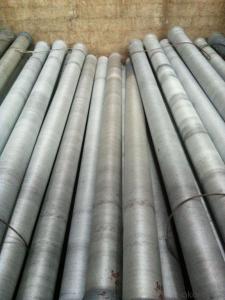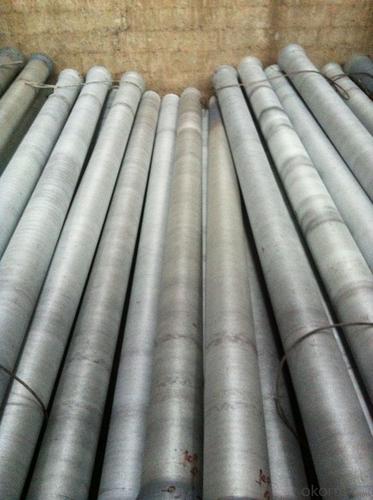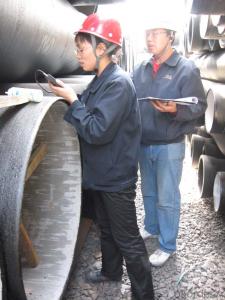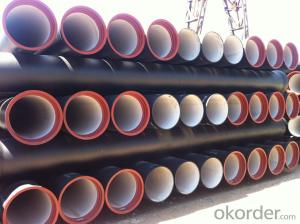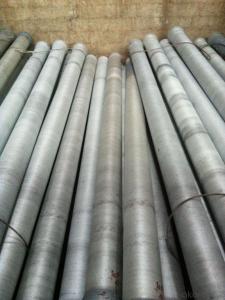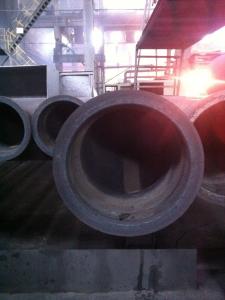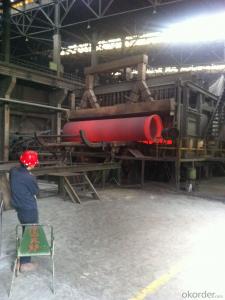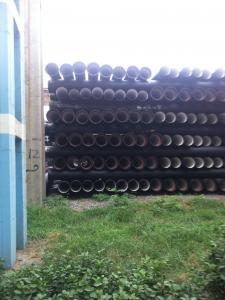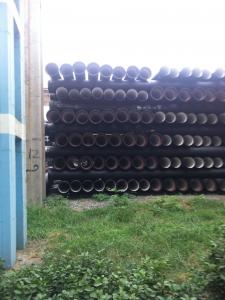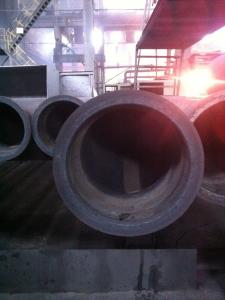DUCTILE IRON PIPES AND PIPE FITTINGS K9 CLASS DN500
- Loading Port:
- Tianjin
- Payment Terms:
- TT OR LC
- Min Order Qty:
- 22 pc
- Supply Capability:
- 3000 pc/month
OKorder Service Pledge
OKorder Financial Service
You Might Also Like
Material : Ductile Cast Iron
Size Range : DN 80mm to DN 2000mm
Unit Effective Length : 6m or 5.7m
Manufacture Standard: ISO 2531:1998/ EN 545:2006/EN 598:2007
Annual capacity : 200,000 tons
Coating Exterior: Zinc 130g/m2 according to ISO 8179-1 and bitumen coating 70 microns.
Cement Interior: Portland Cement/ High Alumina Cement/ Sulphate Resisting Cement Lining according to ISO 4179
Special requirements on external coating and internal lining can be applied
We also provide accessories such as SBR/EPDM rubber gaskets, lubricant paste, pipe caps, PE sleeves, etc.
Additional Parts:
Each pipe is strictly inspected according to related standard to ensure permanently high performance.
Easy Installation at site and service free for life
Long Service Lifespan
Quotation will arrive you within 24hours once we get your inquiry.
We guarantee offering you a competitive price.
A copy of original inspection reports of pipes will be offered after shipment.
Photos of loading process will be sent to the customer after shipment effect.
We will follow-up the delivery progress after shipment effect and update to the customer on weekly basis.
- Q: Can ductile iron pipe be used for industrial wastewater applications?
- Certainly, industrial wastewater applications can make use of ductile iron pipe. Renowned for its robustness, longevity, and corrosion resistance, ductile iron pipe proves itself suitable for a multitude of purposes, including wastewater systems. Its ability to withstand high pressure and endure demanding conditions renders it perfect for industrial wastewater applications that may involve abrasive or corrosive substances. Furthermore, the installation and maintenance of ductile iron pipe are effortless, resulting in reduced costs and guaranteed long-term dependability. Nevertheless, it remains crucial to carefully scrutinize the unique prerequisites of the wastewater application and seek guidance from professionals to ascertain the most fitting pipe material and design.
- Q: What is the excavation width of ductile iron pipes with diameters greater than 1400?
- Because of differences in depth and soil properties, the excavation width is differentUsually to ensure that the width of bottom surface on both sides of the 600 1400+ manual operation. (such a large pipe flange bolt, the tool is not easy to expand, so the need for manual operation. So wide)
- Q: What are the different methods for restraining ductile iron pipe?
- Some different methods for restraining ductile iron pipe include using thrust blocks, tie rods, and flexible couplings. Thrust blocks are concrete structures that are placed at bends or fittings in the pipeline to resist the axial thrust forces. Tie rods are used to connect the pipe to fixed points, providing additional support and preventing movement. Flexible couplings can also be used to restrain pipe by connecting sections together, allowing for some movement while still maintaining stability.
- Q: What is the expected sound attenuation of ductile iron pipes?
- The expected sound attenuation of ductile iron pipes can vary depending on various factors such as pipe diameter, thickness, and the surrounding environment. However, ductile iron pipes generally provide good sound attenuation due to their dense and heavy construction, which helps to minimize the transmission of sound waves.
- Q: Ductile iron pipe is how many years warranty
- Ductile iron pipe warranty is unlimited.
- Q: Can ductile iron pipe be used for wastewater treatment plant sludge dewatering?
- Yes, ductile iron pipe can be used for wastewater treatment plant sludge dewatering. Ductile iron pipe is known for its durability and corrosion resistance, making it suitable for applications in wastewater treatment plants. It can effectively handle the sludge dewatering process and provide reliable performance for long-term use.
- Q: What is the minimum operating temperature for ductile iron pipes?
- The minimum operating temperature for ductile iron pipes is typically -40 degrees Celsius. Ductile iron has excellent strength and ductility even in cold temperatures, making it suitable for a wide range of applications, including water and wastewater systems. However, it is important to note that the specific minimum operating temperature can vary depending on factors such as the specific grade of ductile iron used and the application requirements. It is always recommended to consult the manufacturer's specifications and guidelines to ensure proper usage and performance of ductile iron pipes in cold temperatures.
- Q: What kind of joints are used with ductile iron pipe?
- Mechanical joints or push-on joints are commonly utilized with ductile iron pipe. Mechanical joints involve a gland and a rubber gasket for connecting pipes. These joints are fastened using bolts or other mechanical methods to ensure a secure and tight connection. On the contrary, push-on joints do not demand bolts or extra hardware. They only require the insertion of a rubber gasket into the socket of the pipe, resulting in a sealed connection. Both types of joints are extensively employed with ductile iron pipe, providing dependable and leak-proof connections for diverse applications.
- Q: How much is the manual installation fee of ductile iron pipes from 100 to 150 per metre?
- According to the various connection modes after the installation of artificial fee at =8.7~9.0 yuan (about /M this is pure artificial installation fee, no other costs to calculate, if packet labor costs and construction should be appropriately increased when installed).
- Q: Is the water cast iron pipe 100% for hydrostatic test?
- After the site installation, according to the standard to test pressure, but a lot of construction units are not pressure test
Send your message to us
DUCTILE IRON PIPES AND PIPE FITTINGS K9 CLASS DN500
- Loading Port:
- Tianjin
- Payment Terms:
- TT OR LC
- Min Order Qty:
- 22 pc
- Supply Capability:
- 3000 pc/month
OKorder Service Pledge
OKorder Financial Service
Similar products
Hot products
Hot Searches
Related keywords
